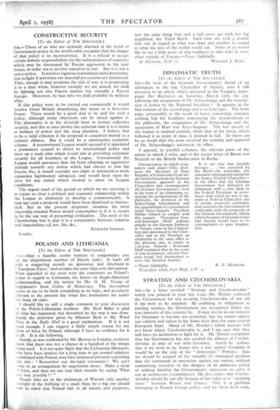CONSTRUCTIVE SECURITY
[To the Editor of THE SPECTATOR.] SIR,—Those of us who are seriously alarmed at the trend of Government policy in the world-crisis recognise that the danger of that policy is its inconsistency. It is a refusal to accept certain definite responsibilities for the independence of countries which may be threatened by Fascist aggression in the near future, in order not to involve ourselves in war. But it is not a peace-policy. It involves vigorous rearmament and a determina- tion to fight if and when our imperial possessions are threatened. Thus, though it may postpone the risk of war, it is postponing it to a time when, however strongly we are armed, we shall be fighting not two Fascist nations but virtually a Fascist Europe. Moreover, by that time we shall probably be without allies.
If this policy were to be carried out consistently it would involve Great Britain abandoning her status as a first-class Power. There would be a good deal to be said for such a policy, although many objections can be raised against it. The alternative is at the eleventh hour to restore collective security, and this at once invites the criticism that it is a return to balance of power and the 1914 situation. I believe that to be a valid criticism if the proposal is conceived merely as a military alliance. But it could be a constructive economic scheme. A reconstituted League would succeed if it appointed a permanent council to direct its international policy and drew up a trade plan which would aim at providing economic security for all members of the League. Concurrently the League would announce that, far from adopting an aggressive attitude towards any nation which had chosen to join the Fascist bloc, it would consider any claim to territorial or trade expansion legitimately advanced, and would keep open the door for any nation which desired to enter on League conditions.
The urgent need of the period on which we are entering is to create so close a political and economic relationship within the League as ultimately to develop a commonwealth. A year ago such a proposal would have been dismissed as imprac- tical. But in the present desperate situation the most imperially-minded Power would contemplate it, if it is shown to be the one way of preserving civilisation. The peril of the Chamberlain line is that it is a compromise between isolation and imperialism.=J „am, Sir, &c., • KENNETH INGRAM. London.














































 Previous page
Previous page